Critical Analysis: Social Media's Impact on Democracy Today
VerifiedAdded on 2023/06/14
|7
|1419
|400
Essay
AI Summary
This essay presents a critical review of the article "From Liberation to Turmoil: Social Media And Democracy," which explores the increasing role of the internet and social media in political discourse, particularly in autocracies and developed democracies. The review highlights the article's analysis of social media as a tool for democratic consolidation, examining its potential for both liberation and suppression. It discusses the benefits of social media in providing a platform for marginalized voices and facilitating collective action, while also acknowledging its vulnerabilities to censorship and the spread of misinformation. The review further critiques the article for not fully addressing how democracies should respond to the challenges posed by social media, including the regulation of terrorist activities and the role of private companies in ensuring online safety. The essay concludes by emphasizing the importance of reviewing the responsibilities of governments and citizens in the digital age for effective use of technology.
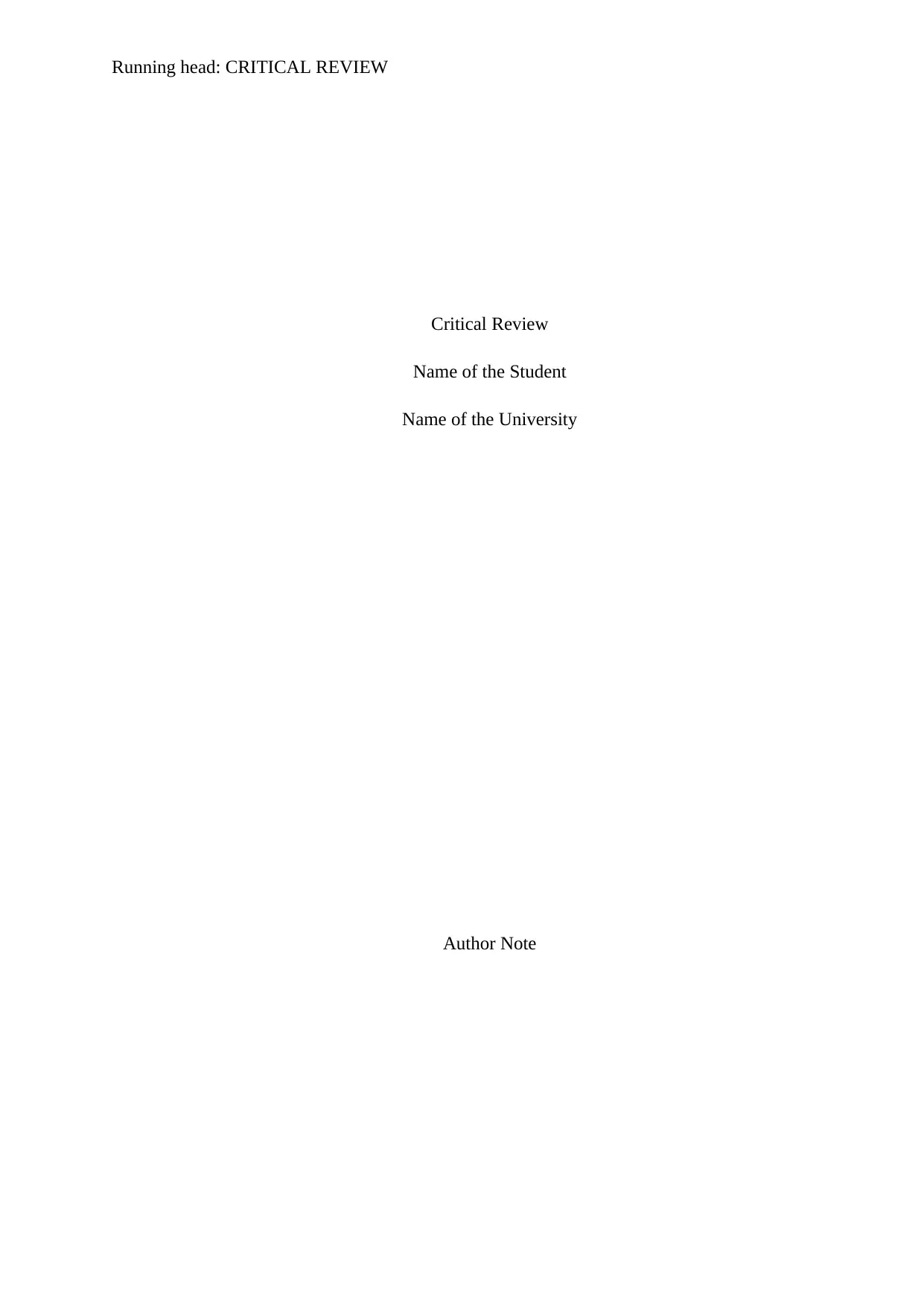
Running head: CRITICAL REVIEW
Critical Review
Name of the Student
Name of the University
Author Note
Critical Review
Name of the Student
Name of the University
Author Note
Paraphrase This Document
Need a fresh take? Get an instant paraphrase of this document with our AI Paraphraser
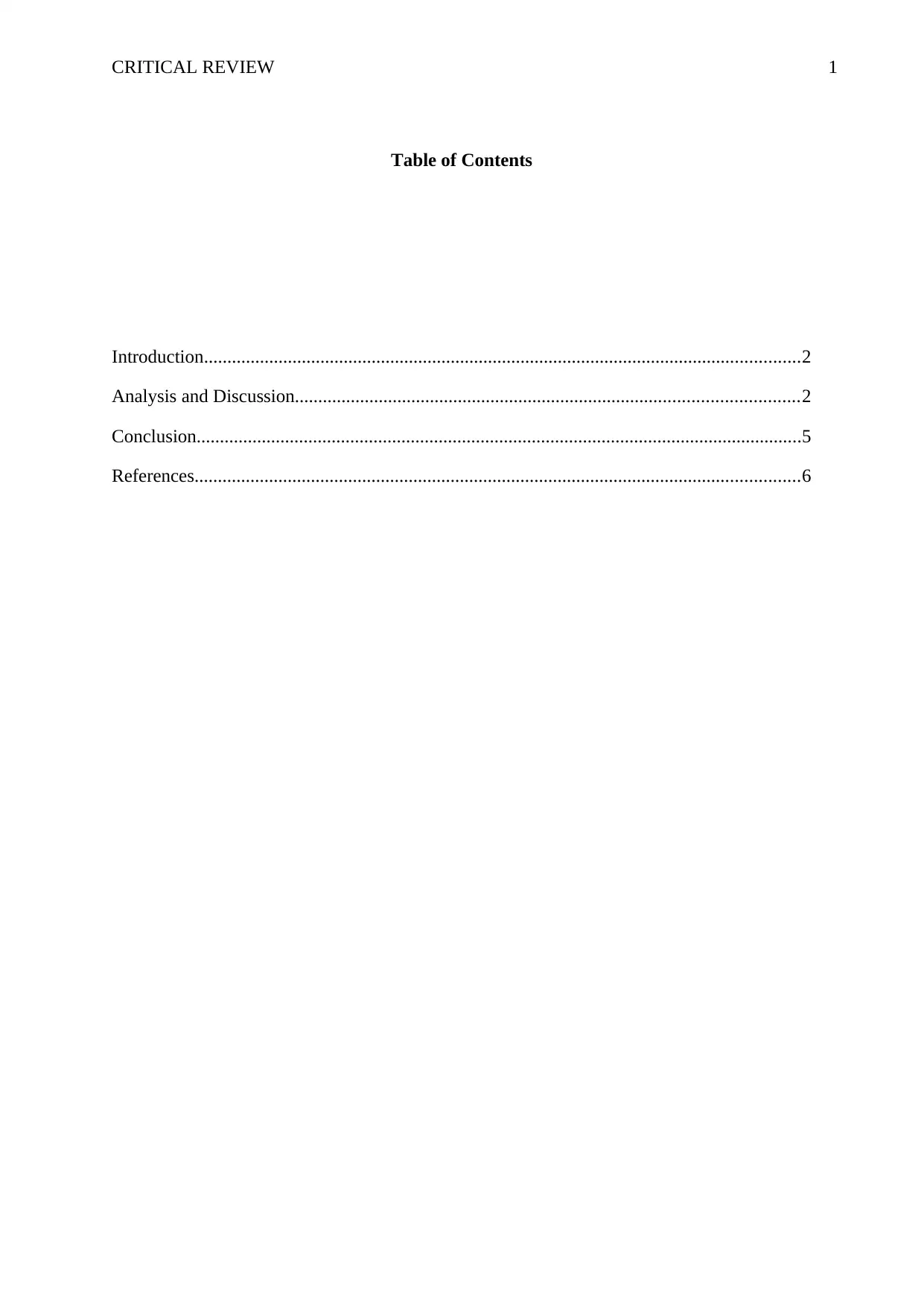
CRITICAL REVIEW 1
Table of Contents
Introduction................................................................................................................................2
Analysis and Discussion............................................................................................................2
Conclusion..................................................................................................................................5
References..................................................................................................................................6
Table of Contents
Introduction................................................................................................................................2
Analysis and Discussion............................................................................................................2
Conclusion..................................................................................................................................5
References..................................................................................................................................6
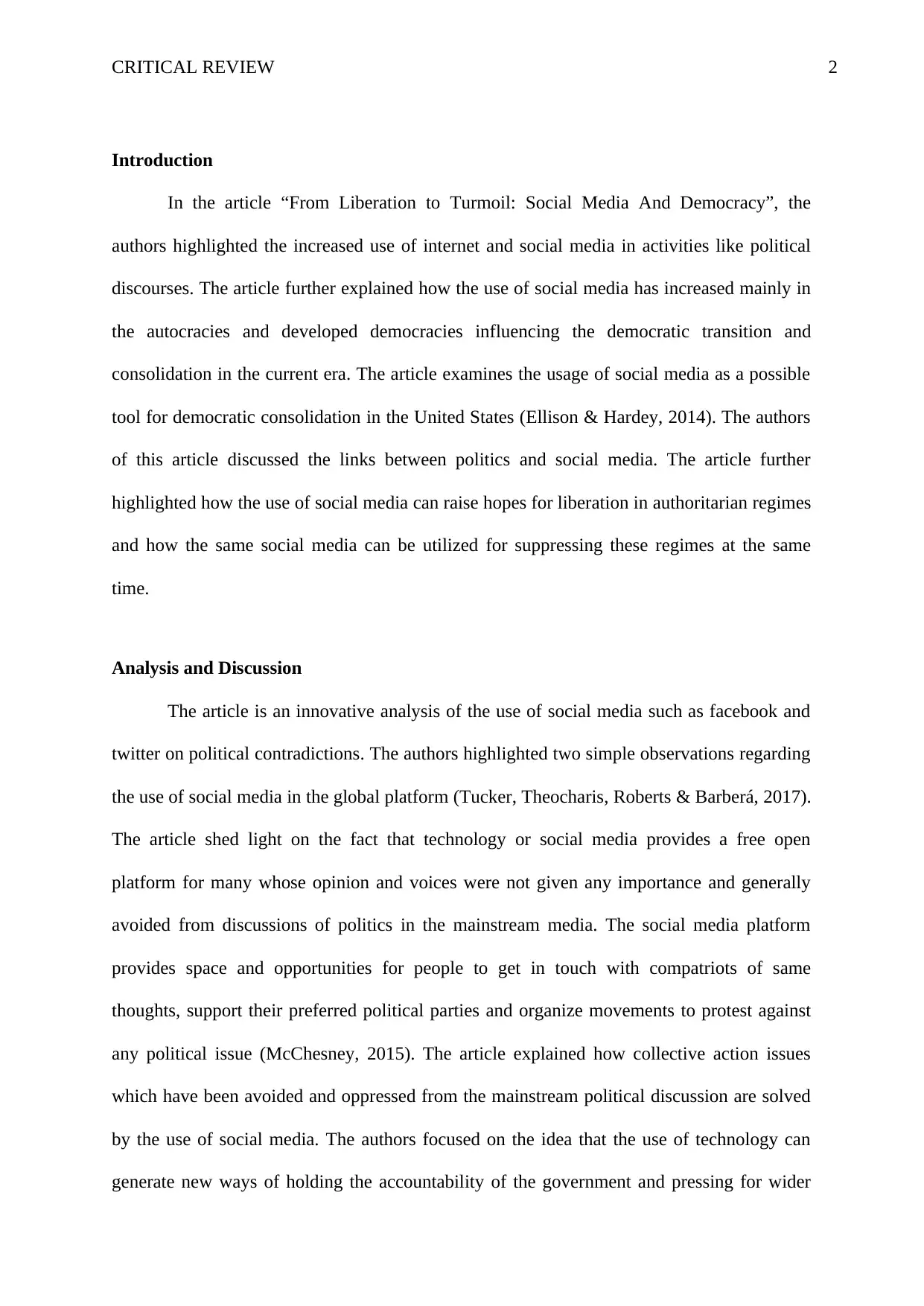
CRITICAL REVIEW 2
Introduction
In the article “From Liberation to Turmoil: Social Media And Democracy”, the
authors highlighted the increased use of internet and social media in activities like political
discourses. The article further explained how the use of social media has increased mainly in
the autocracies and developed democracies influencing the democratic transition and
consolidation in the current era. The article examines the usage of social media as a possible
tool for democratic consolidation in the United States (Ellison & Hardey, 2014). The authors
of this article discussed the links between politics and social media. The article further
highlighted how the use of social media can raise hopes for liberation in authoritarian regimes
and how the same social media can be utilized for suppressing these regimes at the same
time.
Analysis and Discussion
The article is an innovative analysis of the use of social media such as facebook and
twitter on political contradictions. The authors highlighted two simple observations regarding
the use of social media in the global platform (Tucker, Theocharis, Roberts & Barberá, 2017).
The article shed light on the fact that technology or social media provides a free open
platform for many whose opinion and voices were not given any importance and generally
avoided from discussions of politics in the mainstream media. The social media platform
provides space and opportunities for people to get in touch with compatriots of same
thoughts, support their preferred political parties and organize movements to protest against
any political issue (McChesney, 2015). The article explained how collective action issues
which have been avoided and oppressed from the mainstream political discussion are solved
by the use of social media. The authors focused on the idea that the use of technology can
generate new ways of holding the accountability of the government and pressing for wider
Introduction
In the article “From Liberation to Turmoil: Social Media And Democracy”, the
authors highlighted the increased use of internet and social media in activities like political
discourses. The article further explained how the use of social media has increased mainly in
the autocracies and developed democracies influencing the democratic transition and
consolidation in the current era. The article examines the usage of social media as a possible
tool for democratic consolidation in the United States (Ellison & Hardey, 2014). The authors
of this article discussed the links between politics and social media. The article further
highlighted how the use of social media can raise hopes for liberation in authoritarian regimes
and how the same social media can be utilized for suppressing these regimes at the same
time.
Analysis and Discussion
The article is an innovative analysis of the use of social media such as facebook and
twitter on political contradictions. The authors highlighted two simple observations regarding
the use of social media in the global platform (Tucker, Theocharis, Roberts & Barberá, 2017).
The article shed light on the fact that technology or social media provides a free open
platform for many whose opinion and voices were not given any importance and generally
avoided from discussions of politics in the mainstream media. The social media platform
provides space and opportunities for people to get in touch with compatriots of same
thoughts, support their preferred political parties and organize movements to protest against
any political issue (McChesney, 2015). The article explained how collective action issues
which have been avoided and oppressed from the mainstream political discussion are solved
by the use of social media. The authors focused on the idea that the use of technology can
generate new ways of holding the accountability of the government and pressing for wider
⊘ This is a preview!⊘
Do you want full access?
Subscribe today to unlock all pages.

Trusted by 1+ million students worldwide
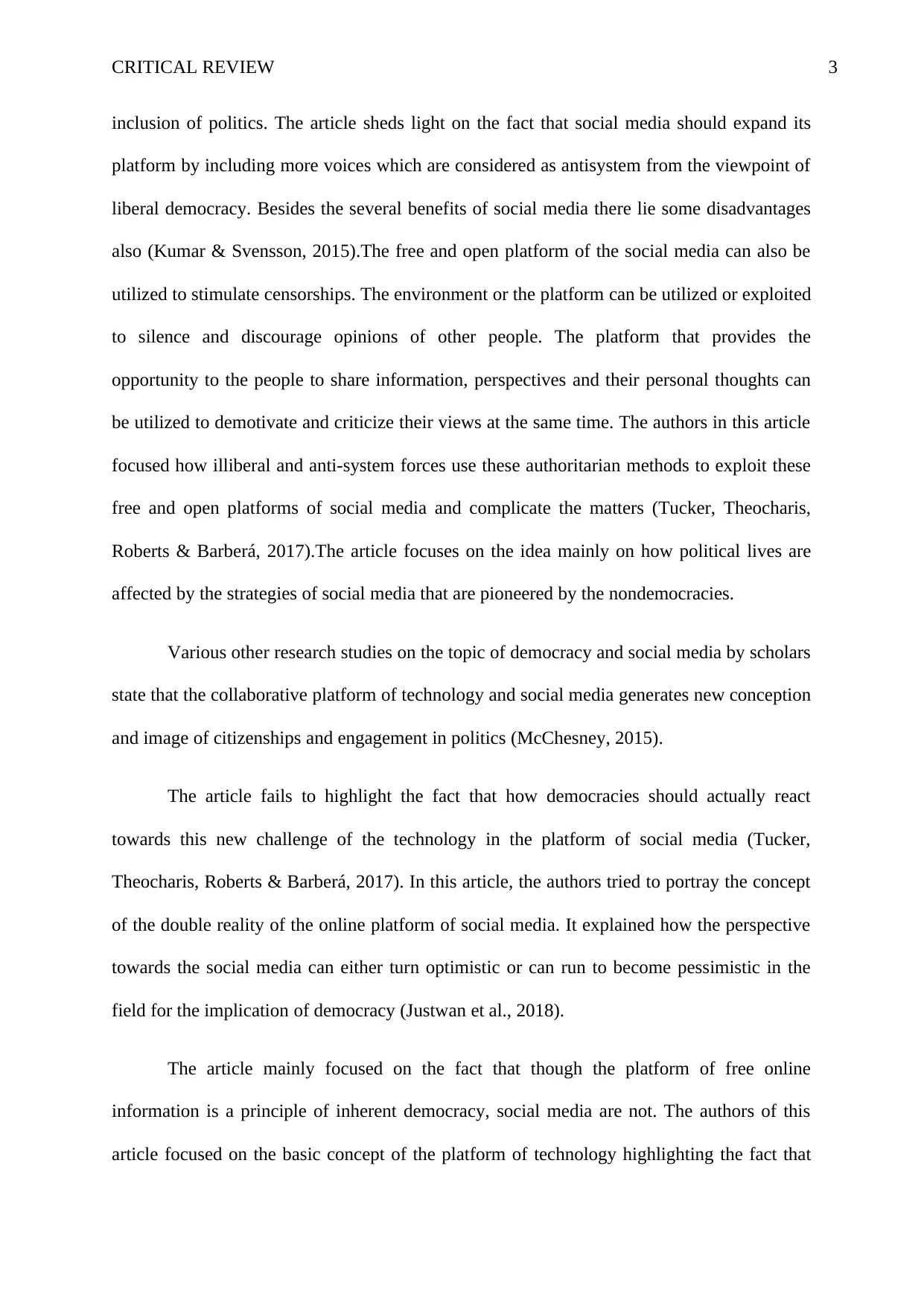
CRITICAL REVIEW 3
inclusion of politics. The article sheds light on the fact that social media should expand its
platform by including more voices which are considered as antisystem from the viewpoint of
liberal democracy. Besides the several benefits of social media there lie some disadvantages
also (Kumar & Svensson, 2015).The free and open platform of the social media can also be
utilized to stimulate censorships. The environment or the platform can be utilized or exploited
to silence and discourage opinions of other people. The platform that provides the
opportunity to the people to share information, perspectives and their personal thoughts can
be utilized to demotivate and criticize their views at the same time. The authors in this article
focused how illiberal and anti-system forces use these authoritarian methods to exploit these
free and open platforms of social media and complicate the matters (Tucker, Theocharis,
Roberts & Barberá, 2017).The article focuses on the idea mainly on how political lives are
affected by the strategies of social media that are pioneered by the nondemocracies.
Various other research studies on the topic of democracy and social media by scholars
state that the collaborative platform of technology and social media generates new conception
and image of citizenships and engagement in politics (McChesney, 2015).
The article fails to highlight the fact that how democracies should actually react
towards this new challenge of the technology in the platform of social media (Tucker,
Theocharis, Roberts & Barberá, 2017). In this article, the authors tried to portray the concept
of the double reality of the online platform of social media. It explained how the perspective
towards the social media can either turn optimistic or can run to become pessimistic in the
field for the implication of democracy (Justwan et al., 2018).
The article mainly focused on the fact that though the platform of free online
information is a principle of inherent democracy, social media are not. The authors of this
article focused on the basic concept of the platform of technology highlighting the fact that
inclusion of politics. The article sheds light on the fact that social media should expand its
platform by including more voices which are considered as antisystem from the viewpoint of
liberal democracy. Besides the several benefits of social media there lie some disadvantages
also (Kumar & Svensson, 2015).The free and open platform of the social media can also be
utilized to stimulate censorships. The environment or the platform can be utilized or exploited
to silence and discourage opinions of other people. The platform that provides the
opportunity to the people to share information, perspectives and their personal thoughts can
be utilized to demotivate and criticize their views at the same time. The authors in this article
focused how illiberal and anti-system forces use these authoritarian methods to exploit these
free and open platforms of social media and complicate the matters (Tucker, Theocharis,
Roberts & Barberá, 2017).The article focuses on the idea mainly on how political lives are
affected by the strategies of social media that are pioneered by the nondemocracies.
Various other research studies on the topic of democracy and social media by scholars
state that the collaborative platform of technology and social media generates new conception
and image of citizenships and engagement in politics (McChesney, 2015).
The article fails to highlight the fact that how democracies should actually react
towards this new challenge of the technology in the platform of social media (Tucker,
Theocharis, Roberts & Barberá, 2017). In this article, the authors tried to portray the concept
of the double reality of the online platform of social media. It explained how the perspective
towards the social media can either turn optimistic or can run to become pessimistic in the
field for the implication of democracy (Justwan et al., 2018).
The article mainly focused on the fact that though the platform of free online
information is a principle of inherent democracy, social media are not. The authors of this
article focused on the basic concept of the platform of technology highlighting the fact that
Paraphrase This Document
Need a fresh take? Get an instant paraphrase of this document with our AI Paraphraser
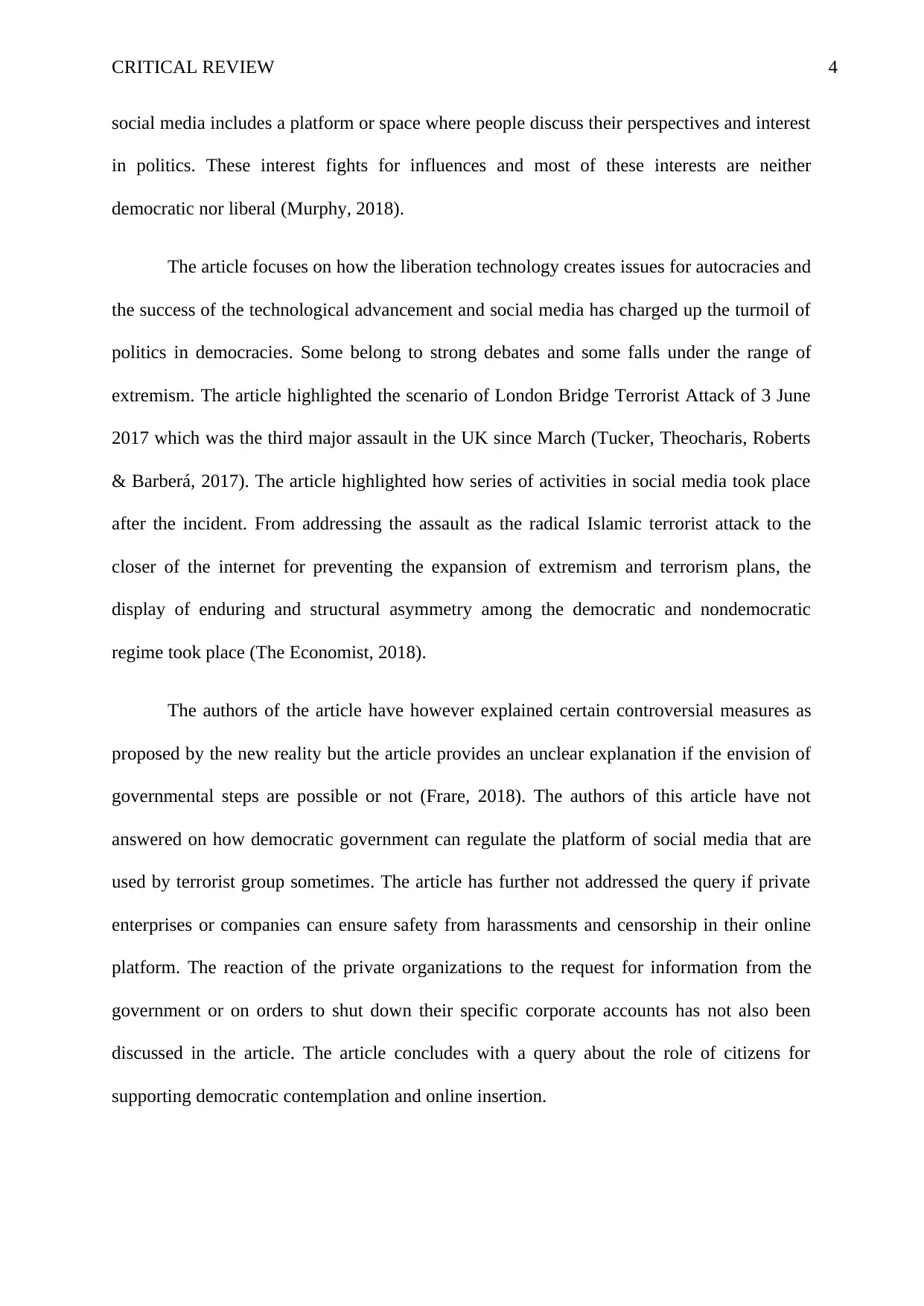
CRITICAL REVIEW 4
social media includes a platform or space where people discuss their perspectives and interest
in politics. These interest fights for influences and most of these interests are neither
democratic nor liberal (Murphy, 2018).
The article focuses on how the liberation technology creates issues for autocracies and
the success of the technological advancement and social media has charged up the turmoil of
politics in democracies. Some belong to strong debates and some falls under the range of
extremism. The article highlighted the scenario of London Bridge Terrorist Attack of 3 June
2017 which was the third major assault in the UK since March (Tucker, Theocharis, Roberts
& Barberá, 2017). The article highlighted how series of activities in social media took place
after the incident. From addressing the assault as the radical Islamic terrorist attack to the
closer of the internet for preventing the expansion of extremism and terrorism plans, the
display of enduring and structural asymmetry among the democratic and nondemocratic
regime took place (The Economist, 2018).
The authors of the article have however explained certain controversial measures as
proposed by the new reality but the article provides an unclear explanation if the envision of
governmental steps are possible or not (Frare, 2018). The authors of this article have not
answered on how democratic government can regulate the platform of social media that are
used by terrorist group sometimes. The article has further not addressed the query if private
enterprises or companies can ensure safety from harassments and censorship in their online
platform. The reaction of the private organizations to the request for information from the
government or on orders to shut down their specific corporate accounts has not also been
discussed in the article. The article concludes with a query about the role of citizens for
supporting democratic contemplation and online insertion.
social media includes a platform or space where people discuss their perspectives and interest
in politics. These interest fights for influences and most of these interests are neither
democratic nor liberal (Murphy, 2018).
The article focuses on how the liberation technology creates issues for autocracies and
the success of the technological advancement and social media has charged up the turmoil of
politics in democracies. Some belong to strong debates and some falls under the range of
extremism. The article highlighted the scenario of London Bridge Terrorist Attack of 3 June
2017 which was the third major assault in the UK since March (Tucker, Theocharis, Roberts
& Barberá, 2017). The article highlighted how series of activities in social media took place
after the incident. From addressing the assault as the radical Islamic terrorist attack to the
closer of the internet for preventing the expansion of extremism and terrorism plans, the
display of enduring and structural asymmetry among the democratic and nondemocratic
regime took place (The Economist, 2018).
The authors of the article have however explained certain controversial measures as
proposed by the new reality but the article provides an unclear explanation if the envision of
governmental steps are possible or not (Frare, 2018). The authors of this article have not
answered on how democratic government can regulate the platform of social media that are
used by terrorist group sometimes. The article has further not addressed the query if private
enterprises or companies can ensure safety from harassments and censorship in their online
platform. The reaction of the private organizations to the request for information from the
government or on orders to shut down their specific corporate accounts has not also been
discussed in the article. The article concludes with a query about the role of citizens for
supporting democratic contemplation and online insertion.
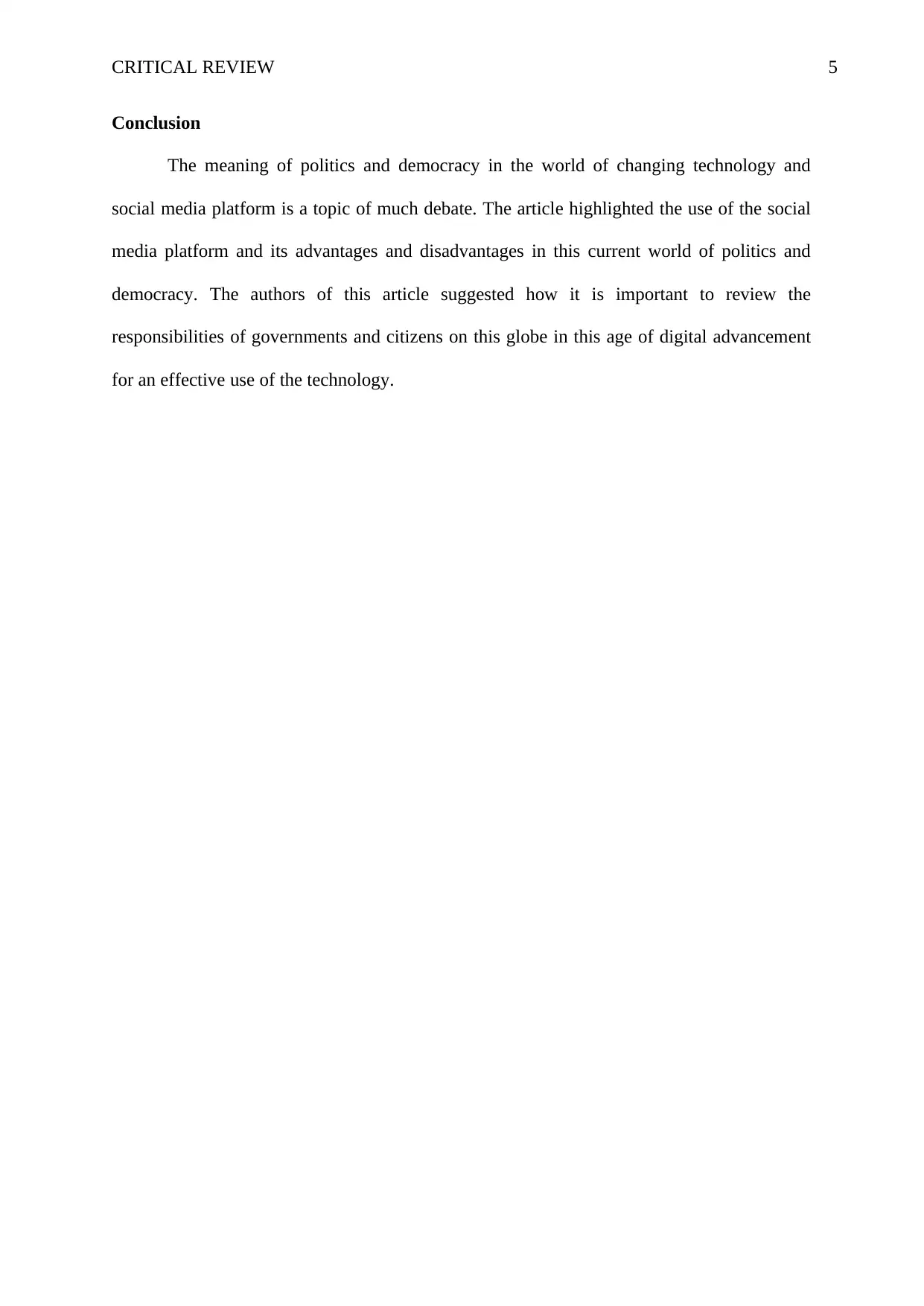
CRITICAL REVIEW 5
Conclusion
The meaning of politics and democracy in the world of changing technology and
social media platform is a topic of much debate. The article highlighted the use of the social
media platform and its advantages and disadvantages in this current world of politics and
democracy. The authors of this article suggested how it is important to review the
responsibilities of governments and citizens on this globe in this age of digital advancement
for an effective use of the technology.
Conclusion
The meaning of politics and democracy in the world of changing technology and
social media platform is a topic of much debate. The article highlighted the use of the social
media platform and its advantages and disadvantages in this current world of politics and
democracy. The authors of this article suggested how it is important to review the
responsibilities of governments and citizens on this globe in this age of digital advancement
for an effective use of the technology.
⊘ This is a preview!⊘
Do you want full access?
Subscribe today to unlock all pages.

Trusted by 1+ million students worldwide
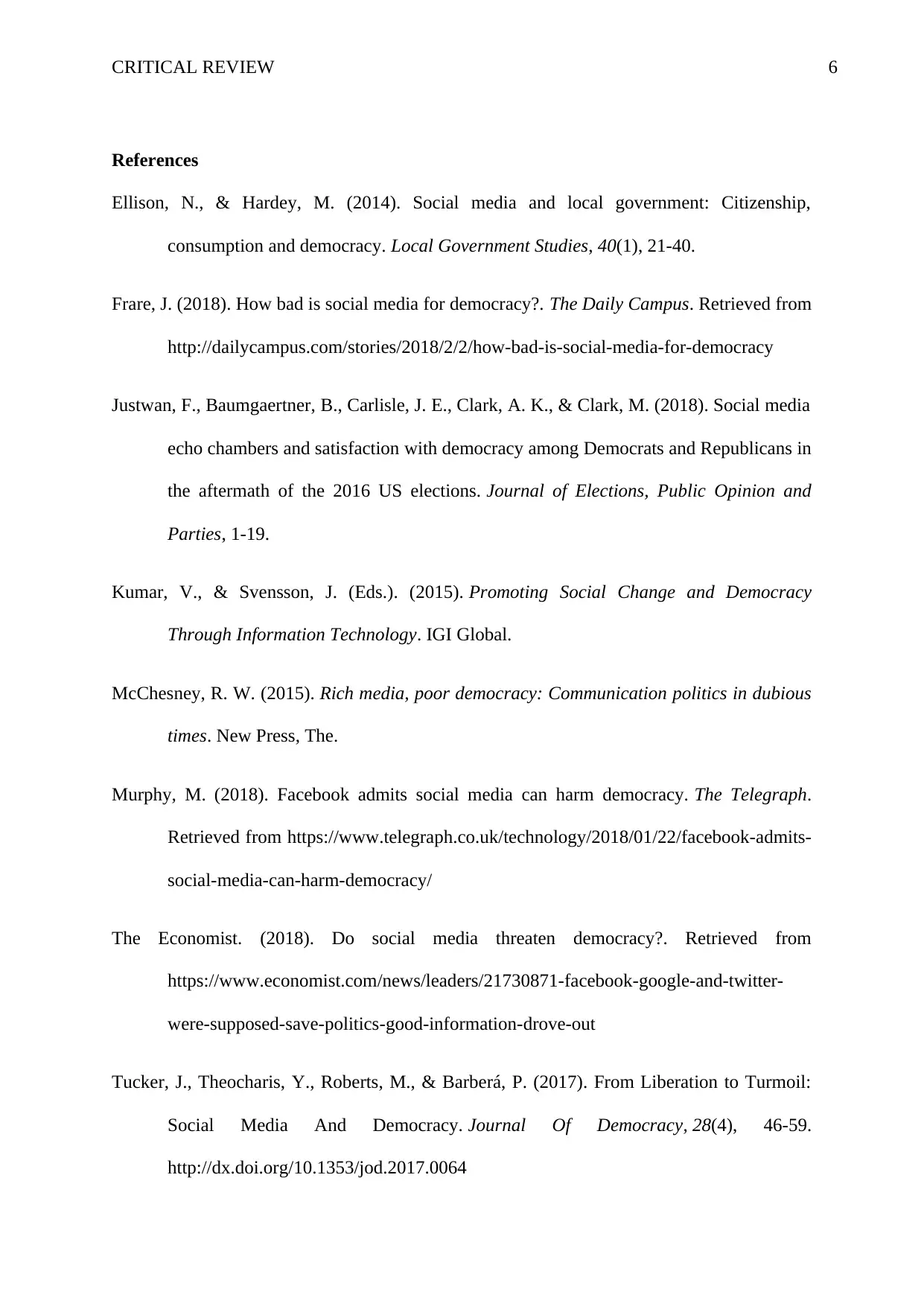
CRITICAL REVIEW 6
References
Ellison, N., & Hardey, M. (2014). Social media and local government: Citizenship,
consumption and democracy. Local Government Studies, 40(1), 21-40.
Frare, J. (2018). How bad is social media for democracy?. The Daily Campus. Retrieved from
http://dailycampus.com/stories/2018/2/2/how-bad-is-social-media-for-democracy
Justwan, F., Baumgaertner, B., Carlisle, J. E., Clark, A. K., & Clark, M. (2018). Social media
echo chambers and satisfaction with democracy among Democrats and Republicans in
the aftermath of the 2016 US elections. Journal of Elections, Public Opinion and
Parties, 1-19.
Kumar, V., & Svensson, J. (Eds.). (2015). Promoting Social Change and Democracy
Through Information Technology. IGI Global.
McChesney, R. W. (2015). Rich media, poor democracy: Communication politics in dubious
times. New Press, The.
Murphy, M. (2018). Facebook admits social media can harm democracy. The Telegraph.
Retrieved from https://www.telegraph.co.uk/technology/2018/01/22/facebook-admits-
social-media-can-harm-democracy/
The Economist. (2018). Do social media threaten democracy?. Retrieved from
https://www.economist.com/news/leaders/21730871-facebook-google-and-twitter-
were-supposed-save-politics-good-information-drove-out
Tucker, J., Theocharis, Y., Roberts, M., & Barberá, P. (2017). From Liberation to Turmoil:
Social Media And Democracy. Journal Of Democracy, 28(4), 46-59.
http://dx.doi.org/10.1353/jod.2017.0064
References
Ellison, N., & Hardey, M. (2014). Social media and local government: Citizenship,
consumption and democracy. Local Government Studies, 40(1), 21-40.
Frare, J. (2018). How bad is social media for democracy?. The Daily Campus. Retrieved from
http://dailycampus.com/stories/2018/2/2/how-bad-is-social-media-for-democracy
Justwan, F., Baumgaertner, B., Carlisle, J. E., Clark, A. K., & Clark, M. (2018). Social media
echo chambers and satisfaction with democracy among Democrats and Republicans in
the aftermath of the 2016 US elections. Journal of Elections, Public Opinion and
Parties, 1-19.
Kumar, V., & Svensson, J. (Eds.). (2015). Promoting Social Change and Democracy
Through Information Technology. IGI Global.
McChesney, R. W. (2015). Rich media, poor democracy: Communication politics in dubious
times. New Press, The.
Murphy, M. (2018). Facebook admits social media can harm democracy. The Telegraph.
Retrieved from https://www.telegraph.co.uk/technology/2018/01/22/facebook-admits-
social-media-can-harm-democracy/
The Economist. (2018). Do social media threaten democracy?. Retrieved from
https://www.economist.com/news/leaders/21730871-facebook-google-and-twitter-
were-supposed-save-politics-good-information-drove-out
Tucker, J., Theocharis, Y., Roberts, M., & Barberá, P. (2017). From Liberation to Turmoil:
Social Media And Democracy. Journal Of Democracy, 28(4), 46-59.
http://dx.doi.org/10.1353/jod.2017.0064
1 out of 7
Related Documents
Your All-in-One AI-Powered Toolkit for Academic Success.
+13062052269
info@desklib.com
Available 24*7 on WhatsApp / Email
![[object Object]](/_next/static/media/star-bottom.7253800d.svg)
Unlock your academic potential
Copyright © 2020–2026 A2Z Services. All Rights Reserved. Developed and managed by ZUCOL.



